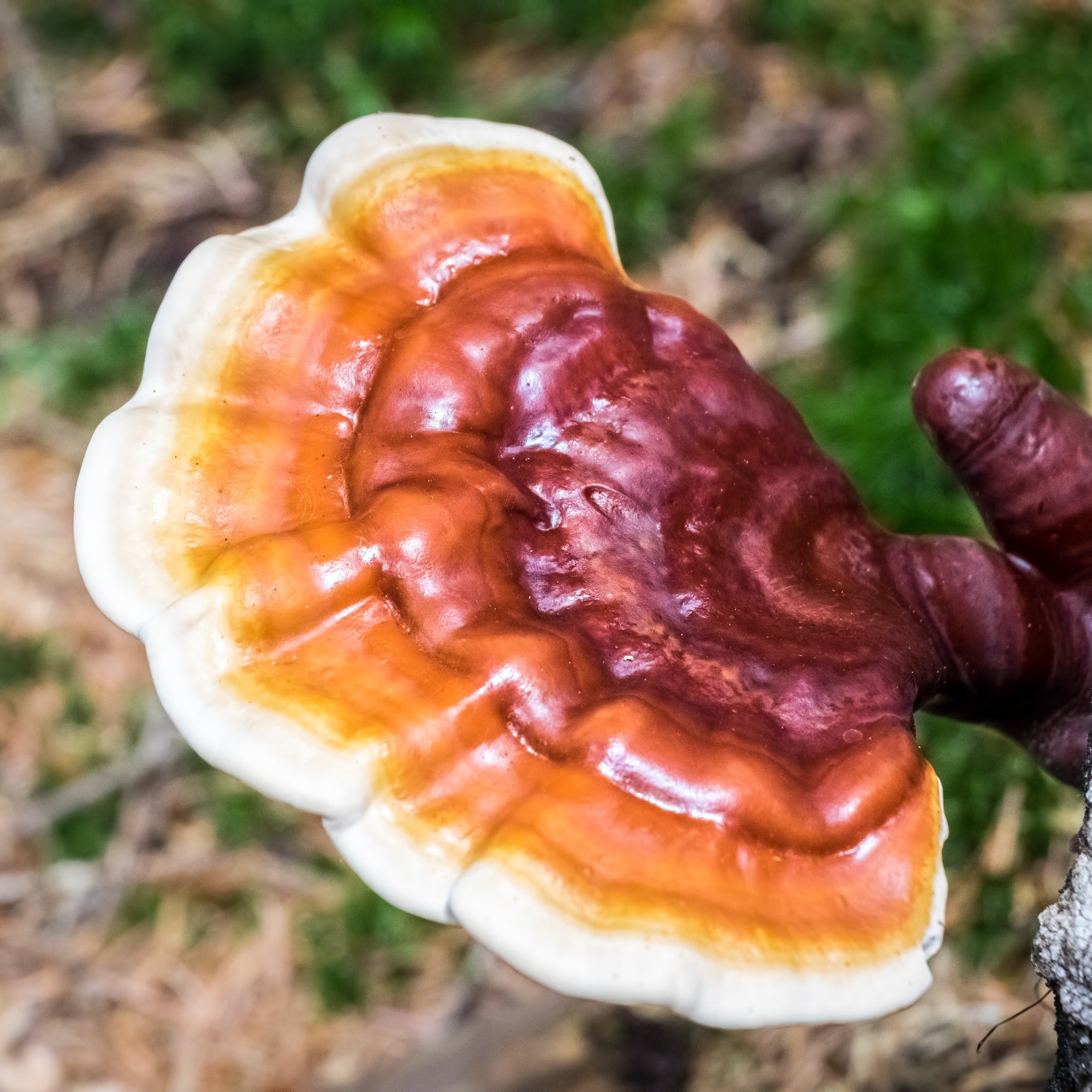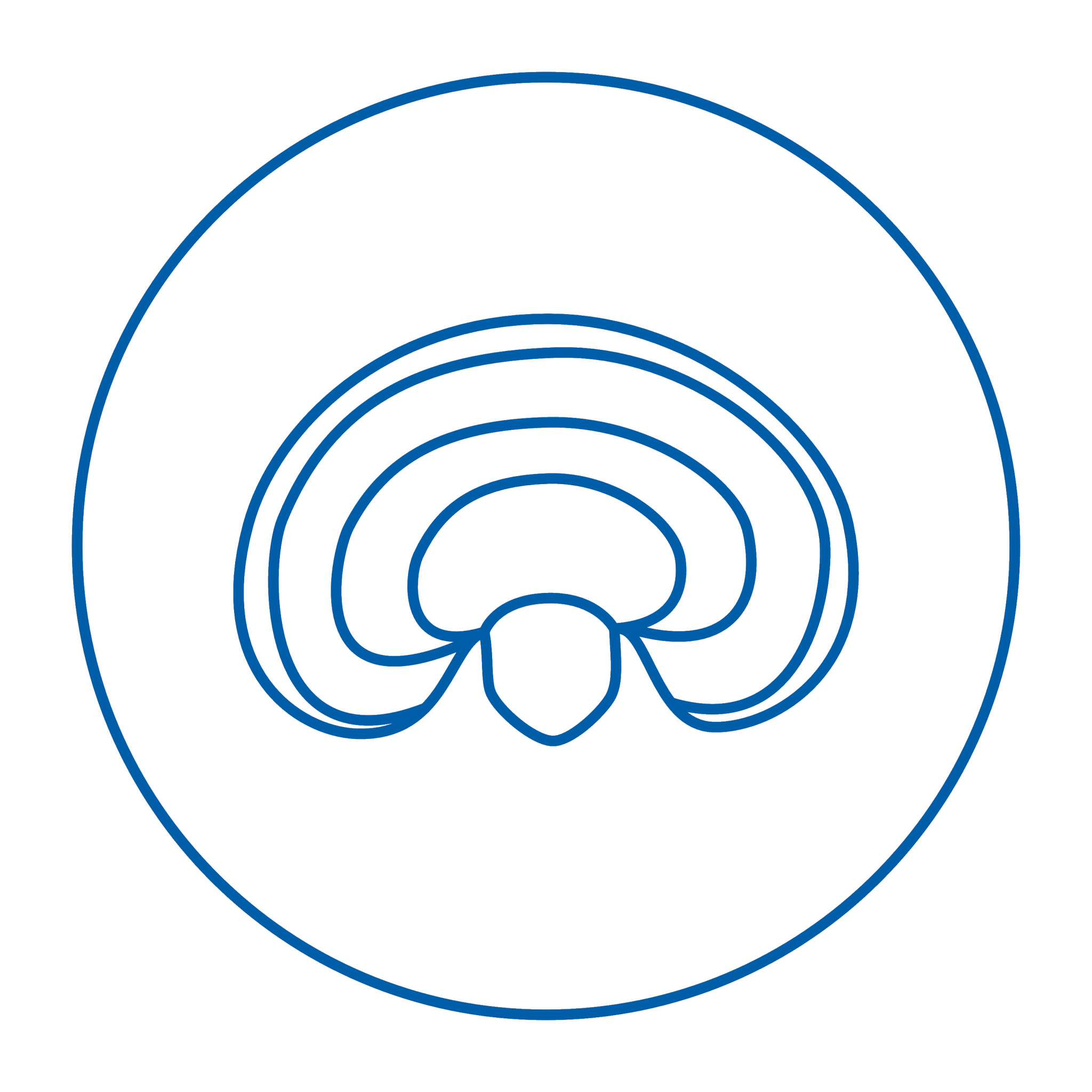-

Reishi (Ganoderma lucidum)
Professional monograph from Dr. Anna Sitkoff, ND
Family: Ganodermataceae
Common names
Lingzhi, reishi
Habitat
Survives on the decomposing wood of conifers either alone or in groups on logs or erupts from wounds on living trees. Fruits annually fall through spring.
Description
A kidney-shaped cap forms the basidiocarp, a large sporophore (fruiting body).
Part used
Mushroom/sporophore/basidiocarp, mycelium and primordia
Energetics
Warming, tonic, sweet, bitter
Constituents
Polysaccharides, triterpenes, proteins, enzymes, steroids, sterols, nucleotides, fatty acids, vitamins, minerals, ergosterol, (1-3, 1-6)-ß-D-glucans

Pharmacology
Uric acid metabolism. In vitro, a decrease in xanthine oxidase (the terminal enzyme in uric acid formation) activity has been observed in the presence of compounds derived from both G. applanatum and G. Tsugae (1). Mouse models have demonstrated similar results when high serum uric acid levels decreased after administration of G. applanatum extracts. It is observed that this could be due to an increase in organic anion transporter (OAT1), which induced uric acid excretion. Additionally, renal uric acid reabsorption was blocked through inhibition of glucose transporter 9 (GLUT 9) and uric acid transporter 1 (URAT1) (1).
Antiandrogenic. G. lucidum exhibits antiandrogenic effects in vitro and in in vivo animal studies via inhibition of the enzyme 5-α-reductase, which converts testosterone to dihydrotestosterone. Preparations of the mushroom significantly inhibited the growth of the ventral prostate in rats, and decreased levels of prostate specific antigen (PSA, a lab marker used to track prostate enlargement) (2,3,4). The ethanol extract of G. lucidum containing ganoderol B and ganoderic acid DM binds to androgen receptors, inhibiting androgen induced lymph node immune dysregulation in the prostate and inhibits 5-α reductase (4).
Antiatherogenic. Lipid peroxidation of low-density lipoproteins (LDL) particles in the macrovasculature is a major contributor to the pathophysiology of atherosclerosis. Animal studies have demonstrated the antiatherogenic effects of G. lucidum polysaccharides, revealing that after administration, rats had decreased levels of triglycerides and LDL-c, lower liver weight, and increased HDL-c, serum superoxide dismutase, and glutathione peroxidase compared to the control (5). Other studies have explored beneficial cardiovascular effects attributed to antioxidant triterpenoids quenching free radicals that are responsible for lipid peroxidation (6).
Blood Sugar Regulation. Ganoderic acids (triterpenes) isolated from reishi inhibit aldose reductase and α-glucosidase, two key enzymes in the treatment of hyperglycemia (7). G. lucidum also contains a protein, LZ-8, that demonstrates immunomodulatory activity via decreasing lymphocyte infiltration and increasing antibody detection of insulin in pancreatic ß-cells. Some studies have found that this immunomodulatory action is due to LZ-8 stimulating FOXP3 regulatory T cells, indicating a possible benefit for other autoimmune diseases (8).
Immune. G. applanatum triterpenoids and polyketides have immune-modulating effects in vitro and in vivo in animal models. These triterpenoid compounds support a healthy inflammatory response and antioxidant activity, and have immune-regulating effects via upregulation of caspase-3 and increased p53 tumor suppressor gene expression (9). In vitro, triterpenoids extracted from G. lucidum ganoderic acids have a number of immune-modulating actions that have been observed in many conditions due to immune dysregulation through inhibition of cell proliferation, induction of apoptosis via caspase-3, suppression of cell adhesion, inhibition of angiogenesis, and inhibition of migration and invasion (10,11).
Ganoderma triterpenoids also modulate immunity to various pathogens via inhibition of neuraminidase enzymes (12). In addition to the immune-modulating terpenes, water soluble compounds exhibit activity as well (13).
Current and traditional medicinal use
History and folk use
Reishi has been an integral part of Chinese medicine for millennia. This ‘herb of spiritual potency’ is said to nourish the “Shen,” or “Spirit.” Simmering broths of this mushroom were traditionally used to support the Shen by quieting the mind and relieving fatigue.
Current research
Antiandrogenic. In a randomized, double-blind, placebo-controlled and dose ranging study, G.lucidum was administered to men with lower urinary tract symptoms and found to be safe and effective in relieving urinary symptoms in men (14).
Immune. Human clinical trials have shown an increase in IL-2, IL-6 and IFN-γ, while significantly decreasing IL-1 and TNF-α. Additionally, there was a significant increase in mean NK cell activity compared to baseline (15). Taken together, these findings suggest an immunomodulatory effect. Other human studies have supported the use of reishi combined with turkey tail for conditions of immune dysregulation associated with female reproductive organs (16).
Cortisol regulation. Female volunteers with cortisol dysregulation receiving 2g of G. lucidum extract daily had a significant benefit in quality of life parameters compared to the control group. Average serum cortisol level, measured 12 weeks after the first dose, was increased up to 1.5 times from baseline measurement, leading the authors to conclude that women with chronic cortisol dysregulation who generally have low cortisol levels can benefit from reishi intake, and may also see a rise in serum cortisol (17).
Pharmacy
Double extraction. 1:1 - 1:5 liquid extract. The mushroom has been extracted with both water and alcohol.
Hot aqueous extract. Mushroom has been boiled for multiple hours either as a tea or used as a broth.
Powdered extract. 1:1 - 10:1. May be extracted only with water or with both water and alcohol. The extract is then dehydrated into a powdered extract. 10:1 implies that every 1g of extract is equivalent to 10g of dried mushroom.
Myceliated grain. Mycelium is grown on grain substrate and when the mycelium seems to have digested the majority of the grain, the entire block is extracted.
Find Reishi in our IMMUNE and LUNGS formulas
References
Want to learn more? Visit our research collection on PubMed
1. Yong T, Chen S, Xie Y, et al. Hypouricemic effects of Ganoderma applanatum in hyperuricemia Mice through OAT1 and GLUT9. Front Pharmacol. 2018;8(JAN):1-11. doi:10.3389/fphar.2017.00996.
2. Nahata A, Dixit VK. Ganoderma lucidum is an inhibitor of testosterone-induced prostatic hyperplasia in rats. Andrologia. 2012 May;44 Suppl 1:160-74. doi: 10.1111/j.1439-0272.2010.1155.x. Epub 2011 Jun 8. PubMed PMID: 21651601.
3. Shrivastava A, Gupta VB. Various treatment options for benign prostatic hyperplasia: A current update. J Midlife Health. 2012 Jan;3(1):10-9. doi: 10.4103/0976-7800.98811. PubMed PMID: 22923974; PubMed Central PMCID: PMC3425142.
4. Liu J, Shimizu K, Konishi F. The anti-androgen effect of ganoderol B isolated from the fruiting body of Ganoderma lucidum. Bioorg Med Chem. 2007;15(14):4966-4972. doi:10.1016/j.bmc.2007.04.036.
5. Wu S. International Journal of Biological Macromolecules Hypolipidaemic and anti-lipidperoxidant activities of Ganoderma lucidum polysaccharide. Int J Biol Macromol. 2018;118:2001-2005. doi:10.1016/j.ijbiomac.2018.07.082.
6. Hsu P, Lin Y, Ni H, Mo F. Ganoderma Triterpenoids Exert Antiatherogenic Effects in Mice by Alleviating Disturbed Flow-Induced Oxidative Stress and Inflammation. 2018;2018.
7. Chen ML, Hsieh CC, Chiang BL, Lin BF. Triterpenoids and polysaccharide fractions of Ganoderma tsugae exert different effects on antiallergic activities. Evidence-based Complement Altern Med. 2015;2015. doi:10.1155/2015/754836.
8. Ma H, Hsieh J, Chen S. Phytochemistry Anti-diabetic effects of Ganoderma lucidum. Phytochemistry. 2015;114:109-113. doi:10.1016/j.phytochem.2015.02.017.
9. Elkhateeb WA, Zaghlol GM, El-Garawani IM, Ahmed EF, Rateb ME, Abdel Moneim AE. Ganoderma applanatum secondary metabolites induced apoptosis through different pathways: In vivo and in vitro anticancer studies. Biomed Pharmacother. 2018;101(February):264-277. doi:10.1016/j.biopha.2018.02.058.
10. Cheng S, Sliva D. Ganoderma lucidum for Cancer Treatment : We Are Close but Still Not There. 2015. doi:10.1177/1534735414568721.
11. Nguyen VT, The N, Dao T, et al. Phytochemistry Letters Cytotoxic and anti-angiogenic effects of lanostane triterpenoids from Ganoderma lucidum. Phytochem Lett. 2015;12:69-74. doi:10.1016/j.phytol.2015.02.012.
12. Zhu Q, Bang TH, Ohnuki K, Sawai T, Sawai K, Shimizu K. Inhibition of neuraminidase by Ganoderma triterpenoids and implications for neuraminidase inhibitor design. Sci Rep. 2015;5(AUGUST):13194. doi:10.1038/srep13194.
13. Eo SK, Kim YS, Lee CK, Han SS. Antiviral activities of various water and methanol soluble substances isolated from Ganoderma lucidum. J Ethnopharmacol. 1999;68(1-3):129-136. doi:10.1016/S0378-8741(99)00067-7.
14. Noguchi M, Kakuma T, Tomiyasu K, Kurita Y, Kukihara H, Konishi F. Effect of an extract of Ganoderma lucidum in men with lower urinary tract symptoms : a double-blind , placebo-controlled randomized and dose-ranging study. 2008;10(4):651-658. doi:10.1111/j.1745-7262.2008.00336.x.
15. Gao Y, Zhou S, Jiang W, Huang M. Effects of Ganopoly ( A Ganoderma lucidum Polysaccharide Extract ) on the Immune Functions in Advanced-Stage Cancer Patients. 2003;32(3):201-215. doi:10.1081/IMM-120022979.
16. Donatini B. Control of Oral Human Papillomavirus (HPV) by Medicinal Mushrooms, Trametes versicolor and Ganoderma lucidum: A Preliminary Clinical Trial. Int J Med Mushrooms. 2014;16(5):497-498. doi:10.1615/IntJMedMushrooms.v16.i5.80.
17. Soksawatmakhin S, Boonyahotra W. Preliminary study of the applications of Ganoderma lucidum in chronic fatigue syndrome.2013 :262-268.
18.. Soo, T Sun. Effective Dosage of the Extract of Ganoderma lucidum in the Treatment of Various Ailments. Mushroom Biol Mushroom Prod. 1996:177-185.

